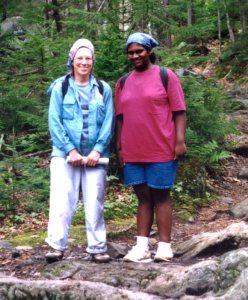Sharon Kinsman Retires from Biology Department After 30 Years of Service
Dr. Sharon Kinsman, a faculty member in the Department of Biology, is retiring from the College after 30 years of teaching, mentoring and service to the college. Having completed her doctorate at Cornell University and post-doctoral research in Costa Rica, Sharon came to Bates from a visiting assistant professorship at Swarthmore College in 1985. An expert in plant-insect interactions and pollination biology, as well as plant ecology, Sharon also followed her interdisciplinary interests in feminist science studies. With cheerful efficiency, Sharon served as Biology Department chair from 1997-2000, then stepped in again as interim chair from 2009-2010. During her tenure at Bates College, Sharon served on numerous faculty committees, played a central role on the committee that developed the environmental Studies Program, and was a Program Committee member for Gender and Sexuality Studies for many years. In service to the department, Sharon frequently mentored new faculty in course development, selection of field study sites, promotion dossiers, and teaching.
Sharon’s research interests include reproductive ecology of temperate and tropical plants, plant demography, plant-insect interactions, pollen delivery, critique of the paradigm of interference by “foreign” pollen, forest stand history (student theses), and forest conservation. Interested in both temperate and tropical systems, Sharon conducted research in New England, Mexico, and Central America. Several of her thesis students carried out research projects in the cloud forest ecosystem at Monteverde, in Costa Rica. She mentored many thesis students, and published research articles and conference abstracts co-authored with several of them. Of her own work, Sharon once told this observer that she never met a bug [insect] she wouldn’t taste in an effort to test the chemical defenses it employed to deter predation. Yum.
Sharon taught a wide array of courses serving Biology as well as the programs in Environmental Studies and Gender and Sexuality Studies: Ecology and Evolution, Invasive Plant Ecology, Forest Ecology, Regional Ecology, The North Woods, Bugs in the System, Entomology, Field Ecology, Protecting Biodiversity, Tropical Field Biology (in Costa Rica and Ecuador), Biological Conservation and Human Communities (in CR), Life, Sex and Cells, Ecology and Evolution of Gender, and Insects and Human Health. Rumor has it that many of her entomology students discovered the culinary delights of crickets by baking “chocolate chirpy” cookies. Having great empathy for struggling students, Sharon often devoted considerable time and energy to help those students master the material and find success in their coursework. A clear and articulate lecturer, she taught from a diverse array of materials in all of her courses, encouraging critical analysis of complex topics and a deeper understanding of the concepts.
“This class has made me see the world and myself differently. I am not afraid of science anymore. I feel like I can have a conversation with someone about biology and not run away in fear. . . . You have opened my mind to a subject I have neglected for too long.” Comment by a student in Life, Sex and Cells from the late 1990’s.
Sharon is especially effective, and truly happiest, working with students in the field. Students taking her field courses were treated to and inspired by her vast knowledge of natural history in both tropical and temperate ecosystems. Said one student in her 2009 Forest Ecology course, “I’ve never had a professor who is as passionate as you about the subject they teach. Your passion is absolutely contagious.” Several of Sharon’s students have gone on to become excellent field biologists in both academic and conservation organizations. Sharon also contributed “north woods” ecology units to the Benjamin Mays Scholars in Biology Summer Program in the mid-90’s, leading diverse groups of 16-18 year old high school students from urban schools into Maine’s north woods.
Conservation of natural systems and tropical forests in particular has been a personal passion over Sharon’s entire career. Heeding ecologist Dan Janzen’s call for tropical ecologists to help save what they study, Sharon volunteered for a grass roots NGO, taking educational tropical rainforest slide shows to numerous schools and clubs in several countries. Children and teachers organized to raise funds, and, with growing media attention, stimulated a larger campaign for children to save a Costa Rican montane forest, now called “The Children’s Eternal Forest” and “Bosque Eterno de los Niños (BEN),” owned and administered by the Monteverde Conservation League. Leading the US branch of the BEN organization as President from 1997-2003, Sharon oversaw the raising and channeling of over $800,000 to purchase forest for the BEN preserve and other threatened forest areas in Costa Rica and Ecuador. Nearer to home, in Maine, Sharon served on the the Maine Natural Areas Program Advisory Board, the Maine Endangered Plant Technical Advisory Committee, and the Scientific Advisory Panel of the Maine Forest Biodiversity Project, contributing her expertise to help preserve and protect Maine wilderness, threatened species, and endangered habitats.
The whole of Sharon’s contributions as a scholar, teacher, mentor, conservationist, and valued member of the Bates community cannot be summed up in a few simple paragraphs. We will miss her wisdom, wealth of knowledge, attention to detail, and collegiality. Her past and present colleagues in the Department of Biology salute her career and accomplishments and wish her the very best in her retirement. We also remind her that BioLunch happens every Wednesday, supplemental department meetings are held periodically in the Den on Friday afternoons, and at both, she will always have a place at the table among friends.


